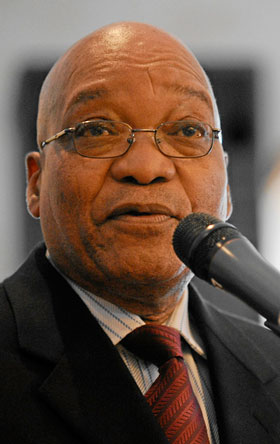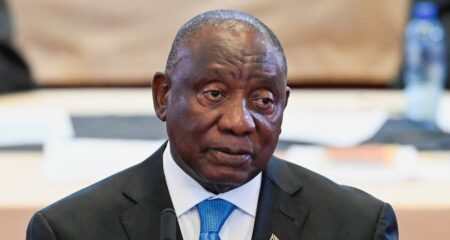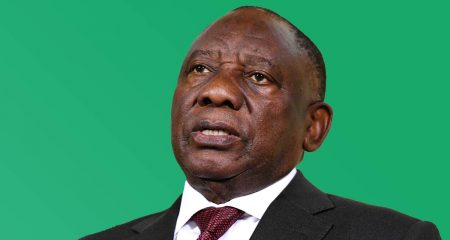
President Jacob Zuma has warded off calls to resign over the scandals that have marred his administration and spread dissent in the ruling party largely thanks to a bloc of politicians known as the “premier league” that has his back.
With urban voters deserting the ANC, Zuma, 74, is increasingly counting on the backing of the premiers of three rural provinces.
When cabinet ministers pressed Zuma to resign at the party’s national executive committee last month, Free State premier Ace Magashule said they should either quit or be fired, according to two people who attended the meeting.
Magashule didn’t answer calls seeking comment.
“There is a reciprocal relationship between Zuma and the three premiers,” said Mcebisi Ndletyana, a politics professor at the University of Johannesburg. “They were propped up by Jacob Zuma, so there is a certain level of personal loyalty to him.”
Both Magashule and David Mabuza of Mpumalanga became premiers within days of each other in May 2009 after Zuma took office as president.
Some analysts see the lobby formed by the premiers and their allies in the ANC’s youth and women wings as powerful enough to determine not only how long Zuma will stay in office but who will succeed him.
The front-runners in the contest are the president’s ex-wife, Nkosazana Dlamini-Zuma, 67, and Cyril Ramaphosa, the 64-year-old deputy president who’s backed by the nation’s biggest labour federation.
“It’s a virtual alternative superstructure within the ANC in which some of the provinces and the leagues — youth, women, veterans — combine their forces to constitute the major force lining up for the succession battle,” said Susan Booysen, a professor at the University of the Witwatersrand’s School of Governance.
Besides Magashule and Mabuza, the group includes the premier of North West, Supra Mahumapelo. The three men deny they’re in a battle for control of the ANC, which Nelson Mandela led to power at the end of white minority rule in 1994. They say they represent South Africa’s “maize corridor”, because their poorer, rural regions rely on corn production.
“There is nothing called the ‘premier league’,” Mabuza said in an interview. “The fear emanates from our past, that we always approached things in the past in a factional way, and people believe if these three are grouping together, probably they want to approach things in the same factional way.”
The three provinces, with about 29,5% of the ANC’s membership according to the party’s latest figures, are closely allied to the leadership in Zuma’s home province of KwaZulu-Natal, which represents 20,5% and should send the most delegates to the conference that chooses a new leader in December next year.
“They seem to be well-based in the grassroots structures of the ANC, compared to their opponents who prefer to play in the media space,” said Ralph Mathekga, a political analyst at the Mapungubwe Institute of Strategic Reflection. “The ‘premier league’ tends to do the hard work on the ground.”

Local elections in August confirmed the ANC’s growing dependence on its rural base. While the party’s support ebbed across the urban-rural divide, it lost most in the cities, ceding control of the capital, Pretoria, and the main economic hub of Johannesburg. Nationwide, its vote slid more than eight percentage points to 54,5%. The loss of metropolitan areas, which also included Nelson Mandela Bay in the Eastern Cape, strengthens the hands of rural leaders inside the party.
“They are now pushing to take power from the metros,” Booysen said. “We know that the metros are decidedly anti-Zuma.”
Credit risk
Zuma’s seven years in office as president has been marred by a succession of scandals and policy missteps that have weighed on the rand and put the nation’s investment-grade credit rating at risk. A year ago, he backtracked on a decision to replace Nhlanhla Nene as finance minister with a then little-known lawmaker after the rand and government bonds plunged.
The constitutional court found in March that he’d breached his oath of office by refusing to comply with a directive from the nation’s graft ombudsman to repay taxpayer money spent on upgrading his private home.
Before stepping down as the nation’s graft ombudsman in October, Thuli Madonsela called for a judicial inquiry into allegations that Zuma allowed the Gupta family, who are his friends and in business with one of his sons, to influence cabinet appointments and state contracts. Both Zuma and the Guptas deny any wrongdoing.
Through it all the “premier league” has stuck by Zuma.
Its goal is “to capture the ANC itself and try and control it”, said Solly Mapaila, deputy secretary-general of the South African Communist Party, an ANC ally that has criticised Zuma.
When tourism minister Derek Hanekom and several other cabinet members urged Zuma to step down at national executive committee, they were echoing complaints by civil-rights groups and opposition parties that he isn’t fit to hold office.
Zuma responded by saying a Western plot and opposition collaborators were behind the bid to oust him, a line analysts say is attractive to the “premier league” and the ANC’s youth and women’s wings.
“They represent a sentiment of new nationalism that the ANC pushes very hard,” said Booysen. It’s a new “patriotism, of anti-Western, anti-foreigner sentiment”. — (c) 2016 Bloomberg LP




